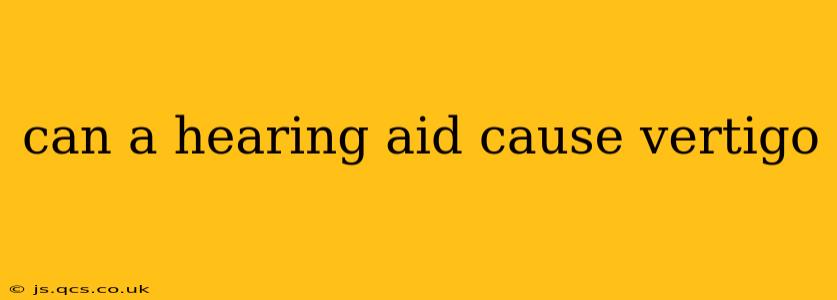Can a Hearing Aid Cause Vertigo? Understanding the Connection
Vertigo, that unsettling sensation of spinning or dizziness, can be a debilitating experience. While not a common side effect, hearing aids can sometimes contribute to feelings of vertigo, especially in certain situations. This article explores the potential link between hearing aids and vertigo, examining the reasons why it might occur and what you can do about it.
What is Vertigo?
Before delving into the relationship between hearing aids and vertigo, it's crucial to understand vertigo itself. Vertigo isn't just dizziness; it's a specific type of dizziness characterized by the sensation that you or your surroundings are spinning. This can be accompanied by nausea, vomiting, and imbalance. Several conditions can cause vertigo, including inner ear infections, Meniere's disease, and benign paroxysmal positional vertigo (BPPV).
How Can Hearing Aids Contribute to Vertigo?
Hearing aids, while designed to improve hearing, can occasionally trigger or exacerbate vertigo symptoms. Here are some key reasons why:
1. Ear Canal Irritation and Pressure Changes: Improperly fitted hearing aids can irritate the ear canal, leading to inflammation. This inflammation can, in turn, affect the delicate balance mechanisms within the inner ear, resulting in dizziness or vertigo. Similarly, a poorly fitting hearing aid might create pressure changes within the ear canal, triggering a similar response.
2. Exacerbation of Existing Conditions: Individuals already suffering from inner ear conditions like Meniere's disease or BPPV might find their symptoms worsened by the presence of a hearing aid. The hearing aid itself doesn't cause the underlying condition, but it might amplify the sensitivity of the inner ear, making existing problems more noticeable.
3. Sudden Changes in Auditory Input: For some individuals, the sudden increase in auditory stimulation provided by a hearing aid can initially lead to feelings of dizziness or imbalance. This is often temporary and resolves as the brain adapts to the new soundscape.
4. Specific Hearing Aid Features: Certain hearing aid features, such as noise reduction algorithms or directional microphones, might process sounds in ways that inadvertently affect the balance system. However, this is less frequent than other causes.
What Types of Hearing Aids Are More Likely to Cause Vertigo?
While any type of hearing aid can theoretically contribute to vertigo, certain factors increase the likelihood:
- Poorly Fitting Hearing Aids: Ill-fitting devices are the most common culprit. A hearing aid that's too tight or too loose can irritate the ear canal and disrupt pressure balance.
- Newly Fitted Hearing Aids: The brain needs time to adapt to the altered auditory input provided by a hearing aid. Initial dizziness is more common in the first few days or weeks of use.
- Open-Fit Hearing Aids: Open-fit hearing aids, while generally comfortable, can sometimes cause issues if not fitted precisely.
What Should You Do If Your Hearing Aid Causes Vertigo?
If you experience vertigo after getting a hearing aid, don't panic. First:
- Contact your audiologist: They can adjust the fit of your hearing aid, ensuring proper placement and pressure.
- Describe your symptoms in detail: Provide a complete account of when the vertigo occurs (immediately after insertion, during specific activities, etc.).
- Consider a trial period with a different style of hearing aid: If adjustments don't resolve the issue, exploring alternate hearing aid styles might be necessary.
- Rule out other causes: It's crucial to rule out other potential causes of vertigo with a medical professional, such as an ENT specialist.
Can Vertigo Be a Sign of a More Serious Problem?
While hearing aids might contribute to vertigo, it's vital to remember that vertigo itself can be a symptom of various underlying health issues. Persistent or severe vertigo warrants immediate medical attention. Do not attempt to self-diagnose.
In conclusion, while a causal relationship between hearing aids and vertigo is not always direct, poorly fitted devices or pre-existing conditions can exacerbate vertigo symptoms. Proper fitting, careful adjustment, and regular follow-up with your audiologist are crucial to minimize the risk and manage any discomfort. Always consult with a medical professional if you experience persistent or severe vertigo.
